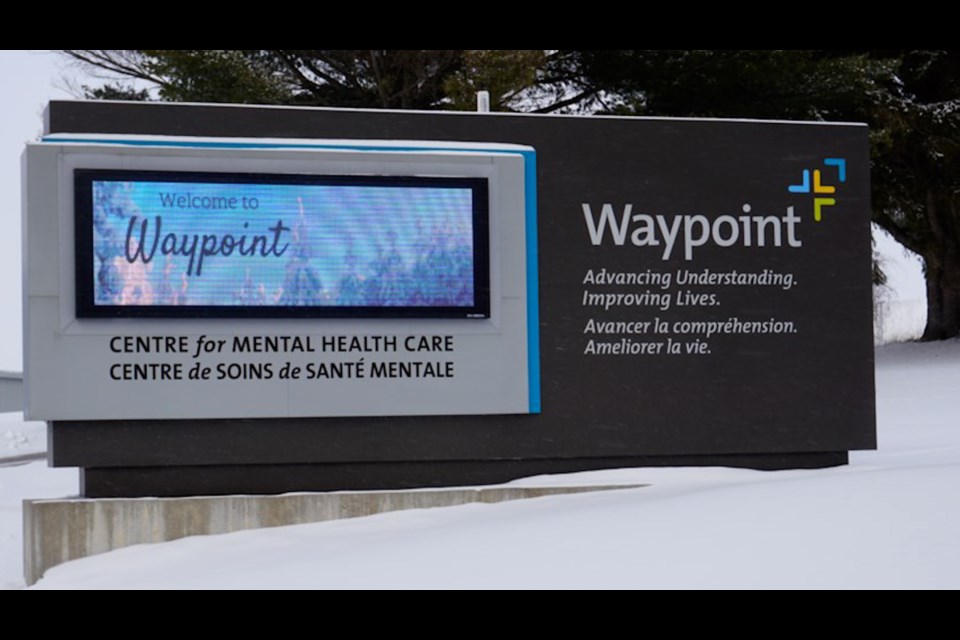Waypoint wants to permanently add 20 acute mental health beds
Since the pandemic began, Waypoint Centre for Mental Health Care has undergone certain changes to its business model.
According to a hospital spokeswoman, the Penetanguishene-based facility has been increasing its acute mental health services while integrating enhanced physical healthcare to help patients and support hospital and health-care system partners during a critical time of bed pressures, staffing challenges and surgical backlogs.
Laurene Hilderley, Waypoint’s communications and fund development director, said the hospital continues to work out the details for the urgent consultation service, but noted the move is expected to divert “avoidable hospital admissions” and hopefully reduce emergency department visits.
“Currently in our region, one in five people visiting the emergency department for a mental health reason has already attended the ED for their mental health within the past month, so we know there are opportunities for improved collaboration and coordination to better meet their needs in the community,” Hilderley said.
“The service will start with one hospital and will not be available around the clock at this time but will provide scheduled times for rapidly accessing a specialist for consultation.”
Added Waypoint president and CEO Dr. Nadiya Sunderji: “We committed to growing our team of family physicians, physician assistants and nurse practitioners to maximize the physical healthcare we’re able to provide here and move patients from emergency departments to Waypoint faster."
Hilderly was also asked how this would mesh with neighbouring Georgian Bay General Hospital’s hope to establish its own acute mental health unit.
“Having a strong and viable community hospital in close proximity to Waypoint is very important for the health and wellness of our patients and clients, families and staff,” Hilderley said.
“We know from our own experience capital construction projects can take many years to come to fruition and Waypoint is focused on how we can work together with hospital and community partners to better support acute mental health patients today, whether its community services for preventing a hospital visit or helping with access to a bed for inpatient care.”
Hilderley said that regionally, the acute mental health system includes beds at Waypoint, Orillia Soldiers’ Memorial Hospital and Royal Victoria Regional Health Centre in Barrie.
“We work collectively to serve Simcoe County and Muskoka Region,” she said. “During the pandemic, Waypoint has also been supporting patients from central Ontario and the GTA, and has been operating as many as 45 acute mental health beds over the last two years, compared with our usual 20 beds pre-pandemic.”
Hilderley said that as the province will be making permanent thousands of beds temporarily opened during the pandemic, Waypoint has proposed to maintain a total of 40 acute mental health beds going forward.
“Pending approvals, we’re able to renovate existing space to open the new 20-bed unit by early 2024, and are able to utilize our existing capacity and expertise to deliver quality care to continue this support to our region.”
In June, the hospital announced the recruitment of Dr. Rebecca (Becky) Van Iersel to replace Dr. Kevin Young as the hospital’s medical director (integrated care) with Young moving into the vice president of medical affairs and chief of staff role.
In her new position, Van Iersel is leading the team of family physicians, physician assistants and nurse practitioners who work along-side Waypoint’s team of psychiatrists and clinical staff to support physical and mental health care needs of patients.
“Waypoint’s innovative approach to integrated physical and psychiatric care is what drew me to the hospital,” Van Iersel said in an earlier release.
“The vision of the hospital’s senior leadership team to expand inpatient physical health care means we can take patients from emergency departments faster and manage both their mental health crisis and primary care needs here.
Van Iersel has an interesting history having grown up in Kathmandu, Nepal, an experience that was quite formative as she witnessed first-hand what it meant to have little access to healthcare and the incredible stress it puts on people. She’s also worked as a family physician in an acute mental health unit at OSMH.
“With our great team and investments in new equipment we also do not have to transport patients out to community hospitals as often, helping to save those very needed acute hospital beds for surgical and other patients,” she added.
Sunderji said Van Iersel is a fantastic addition to the hospital and “her unique clinical and leadership experience with a health systems lens is helping to move forward the great work Dr. Young started over the past few years.”
“Integrated care, combined with our child and youth mental health supports, the outpatient urgent consultation service and the additional acute mental health beds we hope to make permanent, are all part of how we are taking a system approach to meeting today’s pressures on our region and stepping up to care for our community,” Sunderji said.
